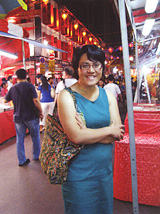Anthropology prepares students for excellent jobs and opens doors to a variety of career paths: our courses of study provide practical information and thinking skills critical to succeeding in the 21st century in business, research, teaching, advocacy, and public service. The job market today is increasingly international and increasingly diverse, and so the kinds of skills developed in Anthropology courses are becoming increasingly valuable. Because Anthropology is the only contemporary discipline that approaches human questions from historical, biological, linguistic, and cultural perspectives, Anthropology graduates are valued for their flexibility and holistic skill-sets. You will find Anthropology graduates working everywhere from Museums to Microsoft.
Learn why companies are desperate to hire anthropologists
Careers in Social Anthropology
A degree in Social Anthropology provides the sort of broad based training that can lead to a wide range of careers. Students acquire a high level of expertise in skills which employers report are highly sought after in the employment market, including problem solving, analysis of information, research and writing, and oral presentations.
Graduates in Social Anthropology find work in museums, as policy advisers for the government or local bodies, in community development, the police force, and project co-ordination and management for non-governmental organisations such as Volunteer Service Abroad. Other interesting careers include journalism, film and media industries, foreign affairs, international aid, teaching, tourism, working with refugees, disaster relief, management, historic preservation, social impact assessment, environmental management — the list is almost endless!
There are also opportunities for pursuing careers specifically in Anthropology and these opportunities — working in universities, museums, consultancy, applied research — require further postgraduate training after finishing the BA.
Moragh Loose (BA, MA Otago), Policy Development Manager, UK General Dental Council
I graduated in 2005 with an MA in Anthropology. My thesis explored the understandings and experience of young carers in New Zealand. Anthropology introduced me to a whole way of thinking and understanding people that I hadn't experienced before. The qualitative research skills I learned as part of my study have been invaluable to me in my job as a Policy Development Manager for the UK General Dental Council in London. I analyse a wide variety of information and consult with lots of different interest groups. I need to be able to comprehend the crucial points quickly. Studying Anthropology at Otago gave me the skills essential for my work. My work includes the development of quality assurance systems to ensure that dental professionals maintain the high standards needed for registration. I often have to communicate abstract ideas to dental professionals and it is crucial that I write well and present clearly. Anthropology helped me to refine these and other communication skills. Highlights from my study include presenting at an international health conference in Iceland on my MA research. This experience set me up well for my current position, and was also a great way to meet others who share a broad interest in Anthropology and health. Through my study in the Anthropology department I was also able to take part in a research project that examined young people's experiences and opinions of dentists and oral health. This gave me valuable work experience which I definitely utilise in my current position. I would recommend Anthropology for anyone who is interested in developing a broad range of skills including learning to understand peoples' perspectives and experiences in a different way.

